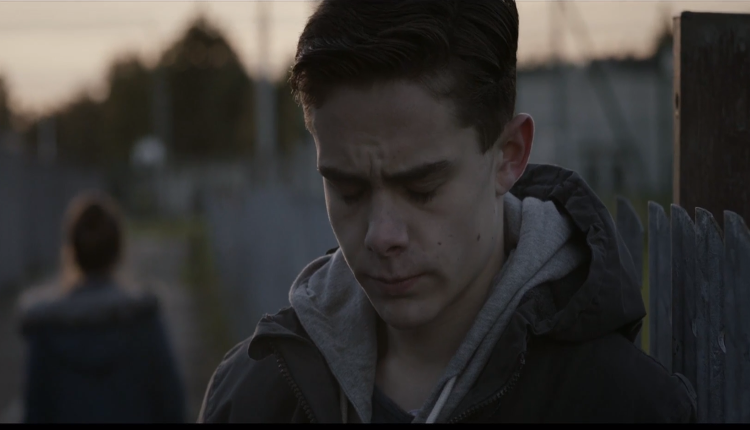Film Review | Why IFTA Winner Michael Inside Lives Up to the Hype
As a title, Michael Inside has a double meaning. Granted, it literally refers to the fact that the film’s lead character is behind bars for much of the runtime, but it also speaks to that same character’s complex interiority. The inner mechanics of Michael’s mind always feel like the implicit focus of the drama and director Frank Berry’s excellent follow up to the already very good I Used to Live Here is better for it. The teenage protagonist speaks as much as Ryan Gosling in a Refn movie. So actor Dafhyd Flynn is left to express a tricky emotional landscape through the boyish expressions of an adolescent forced to prove himself a man. It’s a task he’s more than a match for.
Living with a well-meaning grandad on a rough estate in Dublin, 18-year-old Michael is asked to hold a bag of drugs for a friend’s older brother involved in the city’s criminal underworld. The error of judgment proves costly as soon the guards are at his door, find the cocaine and the teenager is arrested for possession. With a dad already in jail and a conviction in his past, Michael is sentenced to three months in prison. It’s a punishment that has lasting consequences for Michael’s life and one that reverberates to affect his family and the criminal gang who supplied the drugs.
It’s not surprising to hear that Berry spent time researching youth groups and talking to troubled young men from Dublin’s disadvantaged areas prior to filming. Michael Inside has a commitment to gritty authenticity that few films made on this Island can attest to. Berry seems intent on proving to the audience that for men like Michael, violence isn’t always a choice but rather a necessity put upon after they’ve been forced into a corner. The less morally sound decisions the protagonist makes aren’t condoned by the director. Instead, they are always put in context as to why Michael would make them and perhaps more frighteningly, why we believe we might too in his shoes.
This is because Michael really is getting it from all sides. Flynn just about looks his age before his character enters prison. However, compared to their burly, hardened men who populate his block, he appears downright infantile. It’s not long before he is singled out for his youthful naivety and preyed upon by an inmate who brutally assaults him for a TV remote. The clear implication is that if he doesn’t retaliate, the beatings won’t stop. The tragic irony of the system is put on display here. For Michael to acclimatise to prison life, he has to become the violent offender that would never be able to leave such an institution.
An experienced, volatile inmate named David takes Michael under his wing with the younger man having little option but to rely on the older one for protection. As the broad-shouldered mentor of sorts, rising star Moe Dunford delivers the film’s standout performance. With a terrifying twinkle in his eye and a malevolent charm, the actor humanises a character that feels like he could erupt at any moment. He is a troubling vision of Michael’s future; a man weathered by years in prison and so desensitised to violence that it becomes his only currency.
The camera is glued to Michael throughout; his puerile, fresh face lingers long after the credits roll. We are right there, alongside him, for every gruelling decision he must make. When he’s complicit in a chilling acid attack or made to do David’s savage bidding under duress, Berry makes sure that we can always just about understand Michael’s actions. He is after all, just a boy thrust into an unforgiving environment. It’s the gritty verisimilitude the director achieves that’s key to getting this complicated sympathy from viewers. Recreating the humdrum aspects of the prison guard routines is just as important to Berry as the action coming off as authentic. Both add to make the threat to Michael believable.

The ramifications of Michael’s arrest don’t just affect him. They damage those on the outside he left behind. His sweet-natured but worldly grandad, played with understated resilience by veteran Lalor Roddy, is strong armed into paying most of his savings to thugs who feel they are owed money for the drugs lost. Well-aware of his physical limitations to fight back but also resolutely spirited, Roddy is especially terrific in these scenes and deserved some IFTA recognition this year.
The intelligence of Michael Inside is really revealed in its final act. Our hero is released earlier then expected, possibly because the warden has wised up to the potential corruption of the young man. Yet, Berry doesn’t compromise his frank, sardonic outlook. A lesser film would end here but the movie continues to prove to us that, as Dunford’s David puts it “your sentence only starts when you’re released”. The consequences of Michael’s original crime still resonate and he remains imprisoned to the socio-economic realities of his home life. Like so many young men from low income areas, Michael falls victim to the ruthless predeterminism of growing up with little chance of escape.
While it may not technically be Frank Berry’s first feature, this feels like an announcement of an exciting new talent in Irish cinema. Not since Lenny Abrahamson’s Adam & Paul has a filmmaker from this country indicated such a bright future with just one movie. The first real and accomplished filmic document of inner city struggle in sometime, Michael Inside is not just a great drama, but one that could lead to a much welcomed sea-change with regards to the kinds of movies we make.

